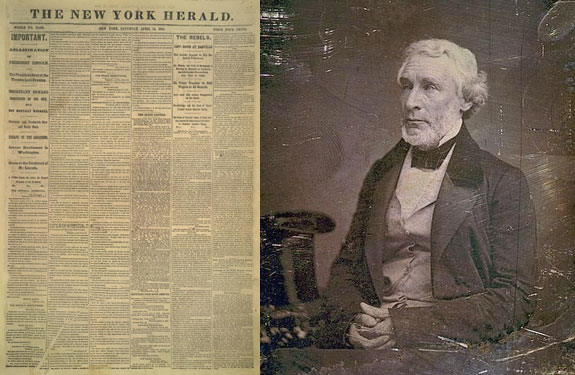January 21

“I have to apologize to my kind readers,” wrote Editor James Gordon Bennett of the New York Herald on this date in 1836, “for the want of my usual life today.” He went on to describe an attack upon his person in which he was severely caned by Col. James Watson, editor of the Courier and Enquirer. “The fellow, no doubt, wanted to let out the never-failing supply of good humor and wit which has created such a reputation for the Herald, and appropriate the contents to supply the emptiness of his own thick skull!”
Bennett, a Scotsman who had come to the United States in 1820, had worked on the staffs of various newspapers before establishing the Herald in 1835 as a penny sheet which was both flippant and sensational and which aroused the ire of the editors of the other New York newspapers. Bennett was not at all put out by the attacks but wrote them up in his own paper. These accounts contributed to its popularity, as it reached a circulation of over fifty thousand copies by 1842.
Bennett could have served as the model for what the public conceived to be the typical newspaper editor. Colorful, controversial, energetic, he built the Herald into one of the finest newspapers of its time. “Shakespeare is the great genius of the drama,” he wrote, “Scott of the novel, Milton and Byron of the poem—and I mean to be the genius of the newspaper press.”
One of his peculiarities was his inability to dismiss an employee. At one time he mistakenly did fire a reporter for a supposed blunder. When asked to rescind the order by several of his editors, he listened to their arguments and finally stated, in the broad Scots tongue which he never lost:
“The mon has been discharged, do ye mind, and that ends the matter. But this office is a large one, and ye ken I dinna know all my men, and if I dinna see him about the place I canna find fault.”
The editors took the hint and the reporter was sent off on a roving mission. On his return to the Herald a year or two later, the first person he met was Bennett, who greeted him kindly, asking:
“Weel, young mon, and how are ye getting on? What paper are ye with now?”
“Why, I’m still on the Herald, Mr. Bennett,” said the correspondent.
“Eh, young mon, there are some things it’s weel not to know, and that’s one of them,” and Bennett passed on without a smile. The reporter remained with the paper for the rest of his life.
One of the important news features in the New York papers of the time was the arrival of steamships with European newspapers. There was great rivalry in getting out in the street first with the information contained in them. Bennett’s editor had a fondness for setting some of the “clip” news items in italic type for emphasis. One day Bennett found that the Tribune and the Times had extras out but the Herald was still on the press. Demanding to know the reason for the delay, he was informed that there were not enough italic cases in the office to set the news fast enough.
“Dom the italic!” Bennett shouted. “Now, Mr. Putnam, I’d have ye to know that the readers of the Herald are not all fools. They can see what is important in the news without having it disfigured with yer dommed italic. Stop it, mon!”